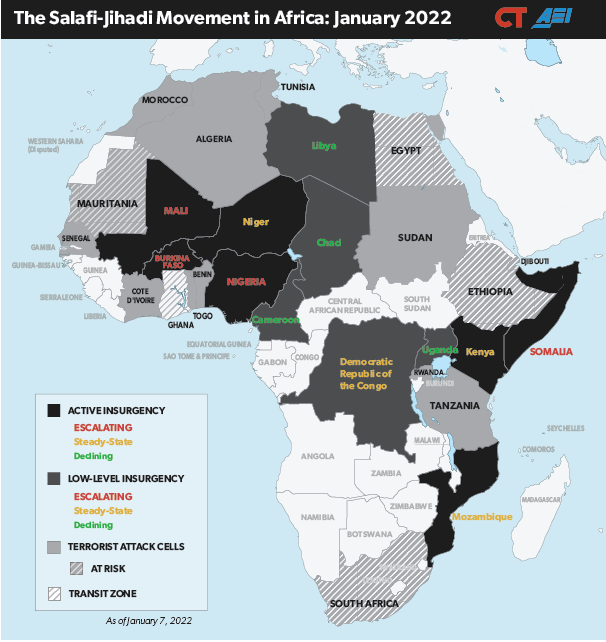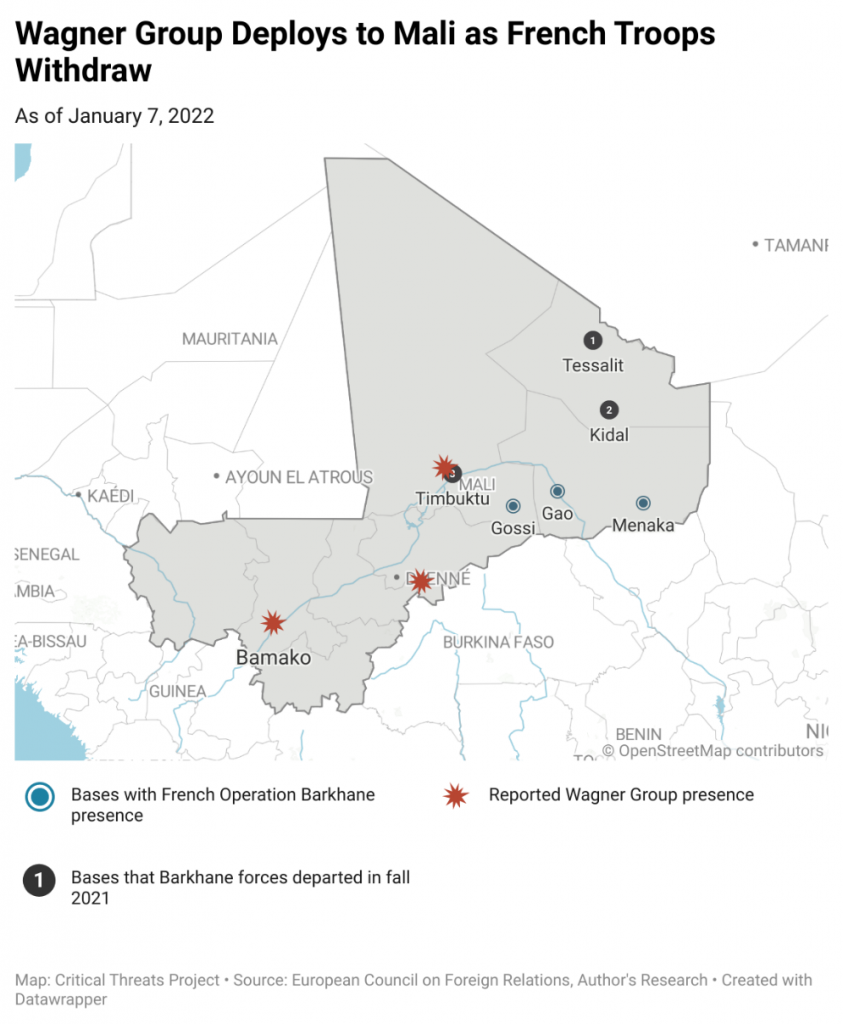Africa File
The Africa File is an analysis and assessment of the Salafi-jihadi movement in Africa and related security and political dynamics.
Africa File: Wagner Group deployment to Mali threatens counterterrorism efforts
[Notice: The Critical Threats Project frequently cites sources from foreign domains. All such links are identified with an asterisk (*) for the reader's awareness.]
To receive the Africa File via email, please subscribe here.
Key Takeaway: The Wagner Group, a Russian private military company, has deployed to Mali. Wagner’s activities will likely worsen popular grievances and accelerate the deterioration of counterterrorism pressure in Mali, allowing Salafi-jihadi groups to strengthen.
Figure 1. The Salafi-Jihadi Movement in Africa: January 2022
View full map.

Source: Authors.
Read an overview of the Salafi-jihadi threat in Africa here.
The Wagner Group is active in Mali. The Wagner Group deployed personnel to Mali in November and December 2021, arriving in the capital, Bamako. Wagner personnel deployed to central and northern Mali in early January 2022. Wagner forces clashed* with members of al Qaeda’s Mali branch, Jama’at Nusrat al Islam wa al Muslimeen (JNIM), in central Mali’s Mopti region on January 3. Likely Wagner forces occupied a base in Timbuktu on January 6 following the November 30 departure* of French Operation Barkhane troops. The Malian government reported that Russian personnel would train Malian troops at the Timbuktu base.
Figure 2. Wagner Group Deploys to Mali as French Troops Withdraw
Source: AEI’s Critical Threats Project and Andrew Lebovich, “Mapping Armed Groups in Mali and the Sahel: Operation Barkhane,” European Council on Foreign Relations, May 2019, https://ecfr.eu/special/sahel_mapping/.
The Wagner Group’s activities will likely worsen the popular grievances that allow JNIM to embed itself in northern and central Mali. JNIM has exploited cyclical intercommunal violence and security force abuses to expand into central Mali in recent years. Wagner forces deployed to other African conflicts have enflamed preexisting conflicts and allegedly committed human rights abuses. The Wagner forces in Mali risk repeating this pattern through either their interactions with local populations or their training of Malian military units that have been accused of human rights abuses.
The Wagner Group may also worsen popular grievances by engaging* in Mali’s mining sector. Local Malian armed groups dominate the mining sector and may challenge Wagner’s incursion, particularly in the north. Grievances around the control of mining and treatment of local populations may also create opportunities for JNIM and other Salafi-jihadi groups to gain popular support and access to mining profits, mirroring the trend in neighboring Burkina Faso.
Wagner Group’s presence will accelerate the deterioration of counterterrorism pressure in Mali to the benefit of Salafi-jihadi groups. Wagner’s deployment to northern Mali will complicate the backfilling* of departing French Operation Barkhane forces by Task Force Takuba, a European special operations task force. European forces are unlikely to train Malian Army units already partnered with Wagner or conduct operations in close proximity to Wagner forces. Wagner’s presence also helps preserve the Malian junta, whose relationship with regional security partners is deteriorating as Mali’s coup leaders resist* a democratic transition. These tensions will likely undermine joint operations under the G5-Sahel joint force. JNIM will likely exploit any backlash to Wagner’s presence and the decrease in counterterrorism pressure to solidify its influence and expand efforts to govern in northern and central Mali.
Read “Mali-Wagner Group deal threatens counterterrorism gains in the Sahel” for more analysis of the deterioration of counterterrorism pressure in Mali.


